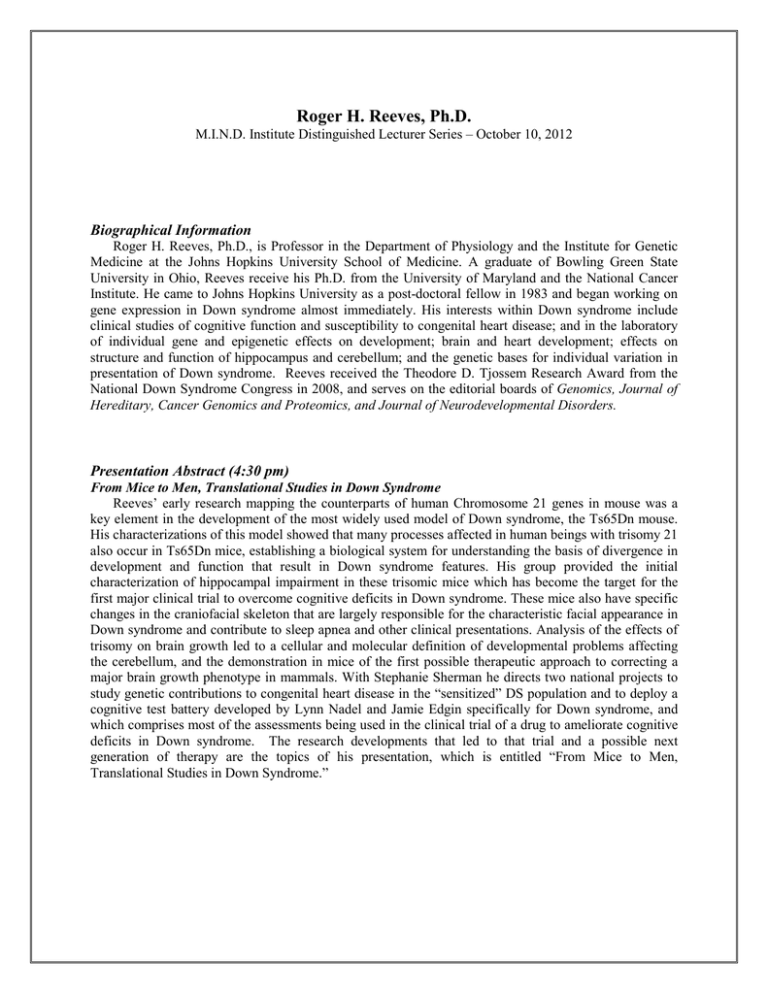Roger H. Reeves, Ph.D. Biographical Information
advertisement

Roger H. Reeves, Ph.D. M.I.N.D. Institute Distinguished Lecturer Series – October 10, 2012 Biographical Information Roger H. Reeves, Ph.D., is Professor in the Department of Physiology and the Institute for Genetic Medicine at the Johns Hopkins University School of Medicine. A graduate of Bowling Green State University in Ohio, Reeves receive his Ph.D. from the University of Maryland and the National Cancer Institute. He came to Johns Hopkins University as a post-doctoral fellow in 1983 and began working on gene expression in Down syndrome almost immediately. His interests within Down syndrome include clinical studies of cognitive function and susceptibility to congenital heart disease; and in the laboratory of individual gene and epigenetic effects on development; brain and heart development; effects on structure and function of hippocampus and cerebellum; and the genetic bases for individual variation in presentation of Down syndrome. Reeves received the Theodore D. Tjossem Research Award from the National Down Syndrome Congress in 2008, and serves on the editorial boards of Genomics, Journal of Hereditary, Cancer Genomics and Proteomics, and Journal of Neurodevelopmental Disorders. Presentation Abstract (4:30 pm) From Mice to Men, Translational Studies in Down Syndrome Reeves’ early research mapping the counterparts of human Chromosome 21 genes in mouse was a key element in the development of the most widely used model of Down syndrome, the Ts65Dn mouse. His characterizations of this model showed that many processes affected in human beings with trisomy 21 also occur in Ts65Dn mice, establishing a biological system for understanding the basis of divergence in development and function that result in Down syndrome features. His group provided the initial characterization of hippocampal impairment in these trisomic mice which has become the target for the first major clinical trial to overcome cognitive deficits in Down syndrome. These mice also have specific changes in the craniofacial skeleton that are largely responsible for the characteristic facial appearance in Down syndrome and contribute to sleep apnea and other clinical presentations. Analysis of the effects of trisomy on brain growth led to a cellular and molecular definition of developmental problems affecting the cerebellum, and the demonstration in mice of the first possible therapeutic approach to correcting a major brain growth phenotype in mammals. With Stephanie Sherman he directs two national projects to study genetic contributions to congenital heart disease in the “sensitized” DS population and to deploy a cognitive test battery developed by Lynn Nadel and Jamie Edgin specifically for Down syndrome, and which comprises most of the assessments being used in the clinical trial of a drug to ameliorate cognitive deficits in Down syndrome. The research developments that led to that trial and a possible next generation of therapy are the topics of his presentation, which is entitled “From Mice to Men, Translational Studies in Down Syndrome.”



